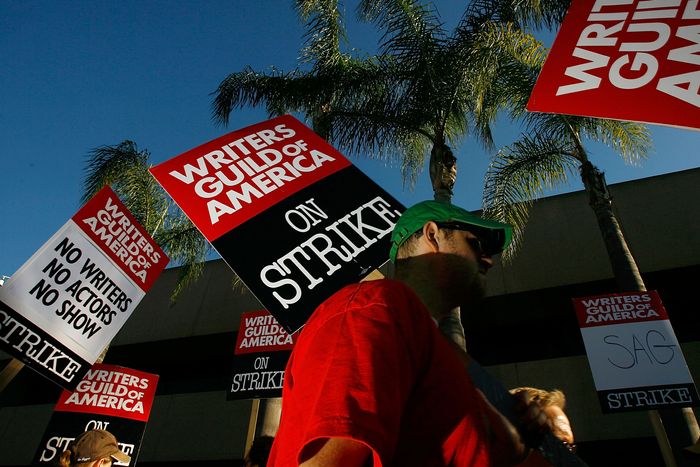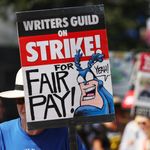
Have you heard about streaming? Well, if not, know that it’s the invasive species of the scripting world — throttling the competition and harmful to the ecosystem if unregulated. And now, because of changes to the entertainment environment due to streaming, both writers and actors are on strike. The WGA asked its writers to vote on authorizing a strike on April 3, and on the 17th, it was officially announced that members had voted to authorize with an overwhelming 97.85 percent “yes” vote. When the deadline for a new contract has passed on May 1, the threat of a writers strike which was looming over Hollywood for some time, transitioned into from “looming” to “here.” A little over two months later, on July 17, SAG-AFTRA also went on strike with a fiery speech from SAG president Fran Drescher to sound the alarm bells. This is the first time that both the WGA and SAG have been on strike against the Alliance of Motion Picture and Television Producers (AMPTP) at the same time since 1960, making it a historical anomaly, if not an unprecedented one. The WGA strike is the first since the 2007–8 strike cursed us with our now-indicted ex-president (no, really — it’s the reason The Apprentice stayed on the air and reified him in the American consciousness as a genius businessman and philanthropist). The strike has served as a reminder that, despite functioning as an escape based on creative output for many, the entertainment business is still, ultimately, a business.
“It’s a very regular-degular, working-class existence,” Alex O’Keefe, a writer for FX’s The Bear, told The New Yorker about his work right before the strike. “And the only future I’m seeking financially is to enter that middle class, which has always been rarified for someone who comes from poverty … I thought we would be treated more like collaborators on a product. It’s like an assembly line now.” While working on the show, his small Brooklyn apartment had no heat and the space heater blew fuses, forcing him to work from a public library. When the show won the WGA Award for Comedy Series, O’Keefe had a negative amount in his bank account and bought his tuxedo on credit. Below, a guide to the 2023 Hollywood strike — because when Deadpool 3 stops filming, you need to know why.
Why is Hollywood on strike?
On March 14, the WGA released a report titled “Writers Are Not Keeping Up.” It details how compensation for writing has been negatively impacted by the advent (and takeover) of streaming. “On TV staffs, more writers are working at minimum regardless of experience, often for fewer weeks, or in mini-rooms, while showrunners are left without a writing staff to complete the season,” the report states. “And while series budgets have soared over the past decade, median writer-producer pay has fallen.” It points to an increase in writers working for the Minimum Basic Agreement across the board in roles ranging from staff writers (98 percent of whom now work for the MBA minimum — up 12 percent from the 2013–14 season) to showrunners (49 percent are at the minimum — up 16 percent). In overall terms, the percentage of TV writers working for the MBA minimum increased from a third in 2013–14 to nearly half of all writers in 2021–22.
This wasn’t the only issue presented, of course. (Lorde said they would rue the day.) The report points to the fact that comedy-variety shows on streaming “have refused basic MBA protections — minimums for scripts and weeklies — for comedy-variety writers when they work on streaming series, even though episodic writers working for the same companies have those minimum standards.” Additionally, regarding the feature-film girlies, the WGA points out that, when you adjust for inflation, “screen pay has declined 14% in the last five years.” So these are the issues. But what are writers gonna do about it? The WGA demands increased minimum compensation in all areas of media, increased residuals, appropriate TV series-writing compensation from pre- to postproduction, increased contributions to pension and health plans, the strengthening of professional standards and the overall protections for writers, and more.
Quite a few of the actors’ and the writers’ demands have similarities, as SAG’s rejected contract lays out. Both are fighting for an increased MBA, with SAG asking for an 11 percent increased minimum in year one and 4 percent in each of the following years. The actors are also looking for increased residuals due to the general impact that streaming has had on the often primary source of actors’ incomes. Kimiko Glenn, of Orange Is the New Black, recently shared a video featuring a check for $27.30 to show the need for an increase in residuals for streaming shows.
One aspect of the SAG strike not on the WGA’s list is SAG’s interest in creating rules regarding self-tape auditions, which are auditions that actors must film at home at their own expense. During the pandemic, they became industry standard, but many actors are paying large amounts of money out of pocket to have their auditions taped professionally with no guarantee of it getting them a job. The AMPTP did offer to provide “guidelines” for the self-tapes, but the guidelines would be unenforced, which means the economic pressures could persist.
When did the WGA strike start?
A strike has been in the air since February, when the L.A. Times reported that both writers and studios were prepping for a potential walkout. The WGA put a “pattern of demands” up for a vote by WGA members on February 27, which included complaints about the “abuse of mini-rooms” (in which fewer writers are given less time to write shows), standardized compensation for feature and streaming films, and commensurate compensation to combat the issues mentioned above. Then, on March 7, 98.4 percent of WGA members voted to approve the demands, so negotiators could bring them to the table in negotiations with the AMPTP, according to Variety.
David Young, chief negotiator for the WGA, left for medical reasons and was replaced by Ellen Stutzman at the beginning of March. Young, whom Matthew Belloni of Puck referred to, at the time of his departure, as “controversial,” led the WGA through the 2007–8 strike and, as Belloni noted, is “fiery” and “feared.” “Nobody does anything in Hollywood unless they’re afraid,” he wrote. “And he’s set a fear-based tone and cadence, if not the actual agenda, for these negotiations.”
Three days before negotiations began, on March 17, Pitch Perfect and Blockers writer Kay Cannon released a video on behalf of herself and other WGA-side negotiators about what would happen once negotiations began. “There may be rumors or leaks to the press about what is going on in that room,” Cannon said, speaking to fellow members of the WGA. “Take these with a grain of salt. They are likely coming from the studios and are intended to scare or distract you and to undermine our strength at the table.”
After the strike was officially announced, both sides put out documents detailing how negotiations went on both sides of the discussion. The WGA’s detailed multiple times in which the AMPTP “rejected” their proposal outright, including on issues like weekly pay for feature writers, AI on MBA-covered projects, and on viewership-based streaming residuals. In other places, the WGA reported that AMPTP countered but not to the point where a compromise could be reached, as on the increased weekly rates of staff writers and story editors/executive story editors and on general minimums.
The AMPTP, meanwhile, put out a document countering with why they couldn’t fulfill the WGA’s requests. Their reasoning included arguments that minimum staffing “quotas” are antithetical to the creative process, that “the first-year general wage increase currently on the table is the highest first-year increase offered to the WGA in more than 25 years,” and that they are offering to “a lot more discussion” of AI moving forward.
How did WGA negotiations go?
Negotiations between the WGA and the AMPTP began on March 20. The intent was for them to last two weeks before taking a two-week break. On the last day of initial negotiations, March 31, Deadline reported that there was a proposal for the two sides to talk during the scheduled break, calling this a “significant step in the negotiations” and noting that sources had told the outlet that “there seems to be a willingness to keep discussions going, in some form, after some common ground was found between the WGA and AMPTP.”
Puck, however, disputed this positive version of events, calling it a “smokescreen,” harkening back to Cannon’s comments about the press. “A well-informed and impartial source, albeit from outside the room, tells me that the report’s spin was ‘nonsense’ and the alleged movement is a ‘charade,’” Jonathan Handel wrote in Puck. He claimed that the negotiations were mostly made up of the two sides reading speeches at each other rather than discussing matters. A source told him, “It truly seems like they just want to strike and have no intention of coming to a deal.”
Negotiations concluded on Monday, May 1, without an agreement, leading to a strike. The first positive news coming from either of the strikes arrived on August 1, when AMPTP president Carole Lombardini reached out to the WGA to restart negotiations. The news was shared to writers via email and the WGA’s social media. Specifically, Lombardini requested a meeting on Friday, August 4, to restart negotiations. On August 11, the writers were presented with a counteroffer and, on August 22, went in for a meeting with Bob Iger, Donna Langley, Ted Sarandos, David Zaslav, and Carol Lombardini. To hear the WGA’s telling of the meeting, they were “met with a lecture about how good their single and only counteroffer was” rather than a negotiation.
Within the AMPTP’s shared document, there are notable points of compromise, as well as points of stubbornness regarding the WGA’s requests. Minimums were given an increase, though not as much as the WGA would have liked, the AMPTP was willing to give writers a ten-week minimum employment, and was willing to guarantee at least two mid-level writers per show, while the WGA requested six. Perhaps the most surprising offer, given streaming’s unwillingness to share streaming data, was that the WGA would be given quarterly reports on hours watched. Regarding AI, the studios limited their offer to saying that, “Written material produced by GAI will not be considered literary material,” and that it would not affect the writers’ “compensation, credit, and separated rights.” This means that writers’ work could still be used to train generative AI.
Apparently, within 20 minutes of the meeting’s end, the AMPTP’s counteroffer was leaked to the press, which the WGA called “the companies’ plan from the beginning — not to bargain, but to jam us. It is their only strategy — to bet that we will turn on each other.”
On August 25, the WGA followed up this statement with an email to its members, detailing why the studios’ counteroffer was not sufficient to end the strike. “The companies’ counteroffer is neither nothing, nor nearly enough,” it wrote, according to The Hollywood Reporter. “We will continue to advocate for proposals that fully address our issues rather than accept half measures like those mentioned above and other proposals not listed here.” The WGA reiterated its stance that companies could afford its demands and pointed out ways that the seemingly large compromises were actually small. On the topic of sharing data, for instance, the WGA wrote that “the companies say they have made a major concession by offering to allow six WGA staff to study limited streaming viewership data for the next three years, so we can return in 2026 to ask once again for a viewership-based residual.” However, “in the meantime, no writer can be told by the WGA about how well their project is doing, much less receive a residual based on that data.” The WGA also pointed out that many writers (such as game-show writers and daytime writers) were still not included under new and broadened MBA terms.
And how about SAG negotiations?
SAG’s contract was initially up on July 1, but discussions were extended through to July 12. Then on July 13, after the discussions were no longer tenable, Nanny and SAG President Fran Drescher announced the strike in a thrilling speech showing why actors make frightening opponents in the press. “I cannot believe it, quite frankly, how far apart we are on so many things,” Drescher said in her speech. “How they plead poverty, that they’re losing money left and right, while giving hundreds of millions of dollars to their CEOs. It is disgusting. Shame on them. They stand on the wrong side of history at this very moment.” She additionally shed some light on how negotiations were going prior to the strike. “I went in in earnest, thinking we that would be able to avert a strike,” she said, later adding. “In earnest, we gave them an extension of 12 days, which they absolutely wasted, making us feel like we’d been duped. Maybe it was just to let studios promote their summer movies another 12 days. They stayed locked behind closed doors; they continued to cancel our meetings with them. We thought, Well, maybe they’re really getting into it, but then what we ultimately received from them was what my mom would call ‘a leck and a schmeck.’”
Are there signs of progress?
Yes, actually! The WGA and the AMPTP released a joint statement on September 20 saying that talks were resuming, the very fact of a joint statement being notable. According to Puck, many people in Hollywood even believed that a deal would be reached on September 21. That … did not happen, but with Disney’s Bob Iger, NBC Universal’s Donna Langley, Netflix’s Ted Sarandos, and Warner Bros. Discovery’s David Zaslav all at the meeting in person, things are looking up. “The WGA and the AMPTP met for bargaining today and will meet again tomorrow,” the WGA said in an update sent to members on September 21, according to Variety. “Your Negotiating Committee appreciates all the messages of solidarity and support we have received the last few days, and ask as many of you as possible to come out to the picket lines tomorrow.” One of the issues that remains contentious is the minimum staffing requirement, Puck reported. Either way, it’s the first time in either strike that the general mood is trending toward optimism.
What was everyone saying about strike authorization?
Notable Hollywood names have taken to Twitter to voice their support for strike authorization in both guilds. “It’s about writers getting their fair share,” Daniel Kwan wrote on Twitter. “It’s about maintaining a healthy middle/working class of writers in our industry. It’s about showing our collective strength as new tech threatens to take away our leverage.”
But this Oscar winner isn’t the only one expressing support. Other writers of hit TV shows and films — Adele Lim (Crazy Rich Asians), Ashley Nicole Black (Ted Lasso, A Black Lady Sketch Show), Justin Halpern (Harley Quinn, Abbott Elementary), Jeffrey Lieber (Lost), Ashley Lyle and Bart Nickerson (Yellowjackets), and many more — have expressed support for their union.
Members of SAG-AFTRA supported their strike prior to it becoming a reality, with the support of a cavalcade of celebrities from Meryl Streep to J.Law to Brendan Fraser. More than 300 celebrities signed a letter to SAG leadership on June 28 saying, “We hope you’ve heard the message from us: This is an unprecedented inflection point in our industry, and what might be considered a good deal in any other years is simply not enough,” among other things.
What shows and films would be most affected by the strikes?
When WGA went on strike, late-night shows were one of the first to be writer-less first. Saturday Night Live and all the talk shows were also caught out in the cold. (For what it’s worth, that might be why James Corden’s last day on The Late Late Show is scheduled for April 27.)
After that, many of the most popular network shows will be on break for the summer, but expect them to be screwed when they come back in the fall, as they typically start writing in the summer. Abbott Elementary, you in danger, girl. You can find a full list of shows and films that have been paused or shutdown by the WGA strike and SAG strike here.
Streaming is kind of a different story. Remember how we said that streaming caused lots of changes to the industry? Well, these strikes are definitely not ideal for them, but streamers often have shows banked for a pretty long time, so they’ll be able to tide audiences over for a while — I mean, the trailer for HBO’s The Sympathizer adaptation came out on April 12, and that show isn’t coming until sometime in 2024. These strikes might force them to focus on more international shows or just parcel out what they already have more slowly. Just like there’s no precedent for how streaming has changed TV, there’s no precedent for how a strike will go down with streamers in the mix.
For SAG, the absence of actors will be most felt on red carpets and during promotion cycles for big summer blockbusters. That’s why the Oppenheimer London premiere was cut short and why only Mickey and Minnie attended Disney’s Haunted Mansion premiere. Reality TV shows and industries outside of SAG and WGA, such as music, podcasts, and books, remain unaffected. Interestingly, the wild world of influencers and content creators are impacted by the strike, too, as some influencers are a part of SAG.
Some projects, like a few A24 films, have been granted interim agreements, meaning SAG actors are allowed to work on those projects as they are not affiliated with the AMPTP. However, as of August 14, in alliance with WGA, SAG-AFTRA will no longer grant interim agreements with any WGA-covered projects in the US.
How do I support the strikes?
If you live in a city where writers and actors are striking, you can always go show solidarity at the picket line. But if you don’t live in a major city and still want to support the strikers, you can donate! The Entertainment Community Fund is helping out the writers, and donating can help fund “supporting programs that foster stability and resiliency, and provide a safety net for performing arts and entertainment workers over their lifespan.” For more ideas on how to help the writers, check out this neat Google Sheet with all kinds of ideas. We promise it’s well written. Meanwhile, SAG has a link on its site to the Emergency Financial Assistance and Disaster Relief Fund, which assists actors in dire financial need. Strike, strike baby.
This is a developing story and has been updated throughout.
More on the 2023 writers' strike
- Matt Walsh (No, Not the Conservative) Delays DWTS Appearance
- Did You Bid on the Union Solidarity Coalition’s Insane Auction?
- The Drew Barrymore Show Now on Pause ‘Until the Strike Is Over’





